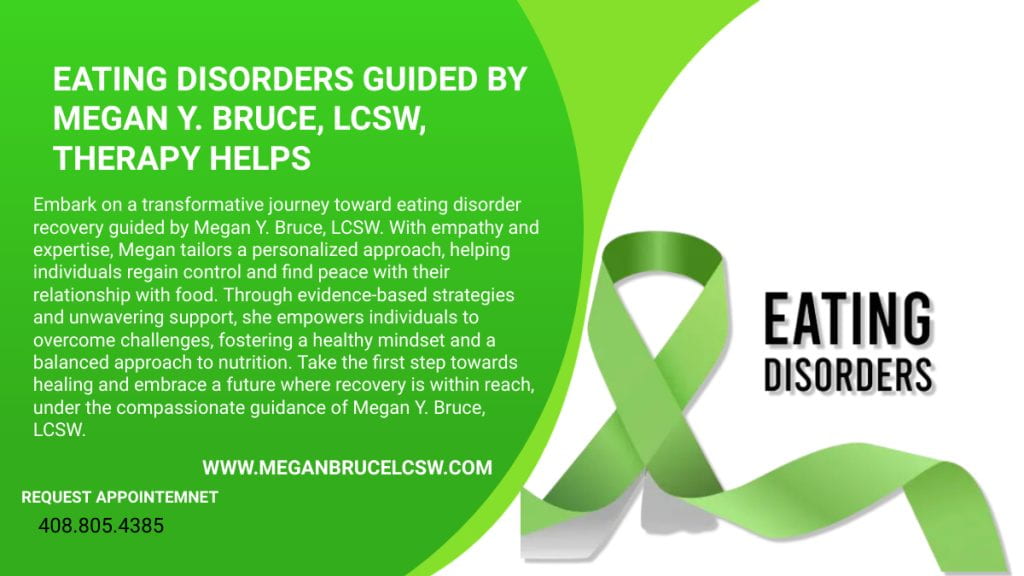Understanding Eating Disorders: Types, Symptoms, Causes, and Treatment Approaches
Author : Meganbruce Lcsw | Published On : 18 Mar 2024

Eating disorders are complex mental health conditions characterized by irregular eating habits and severe distress or concern about body weight or shape. They can affect individuals of any age, gender, or background, and if left untreated, they can lead to serious health consequences. In this article, we’ll delve into the various types of eating disorders, their symptoms, causes, and explore treatment options, including ADHD’s potential link to eating disorders and the effectiveness of family-based therapy and counseling. Additionally, we’ll highlight the importance of eating disorder awareness and introduce therapist Megan Y. Bruce, LCSW, as a resource for individuals seeking support in San Francisco, CA.
- Anorexia Nervosa: Individuals with anorexia nervosa have an intense fear of gaining weight and a distorted body image. They often restrict their food intake, leading to severe weight loss and malnutrition.
- Bulimia Nervosa: Bulimia nervosa involves episodes of binge eating followed by purging behaviors such as vomiting, excessive exercise, or the misuse of laxatives or diuretics.
- Binge Eating Disorder (BED): BED is characterized by recurrent episodes of uncontrollable binge eating without the purging behaviors seen in bulimia nervosa.
- Other Specified Feeding or Eating Disorders (OSFED): This category includes eating disorders that don’t meet the criteria for anorexia, bulimia, or binge eating disorder but still cause significant distress or impairment.
Symptoms and Warning Signs:
- Extreme weight loss or fluctuations
- Obsession with food, calories, and dieting
- Avoidance of social gatherings involving food
- Excessive exercise or preoccupation with physical appearance
- Frequent trips to the bathroom after meals (indicating purging behaviors)
- Noticeable fluctuations in mood, energy levels, or social withdrawal
Causes of Eating Disorders: The development of eating disorders is influenced by a combination of genetic, psychological, environmental, and cultural factors. Some common contributing factors include:
- Genetics and family history
- Psychological factors such as low self-esteem, perfectionism, or trauma
- Societal pressure to attain unrealistic body ideals
- Co-occurring mental health conditions like anxiety, depression, or ADHD
ADHD and Eating Disorders: Research suggests a potential link between ADHD and eating disorders, particularly in adolescents and adults. Individuals with ADHD may exhibit impulsivity, difficulty regulating emotions, and low self-esteem, which could contribute to disordered eating patterns as a coping mechanism.
Treatment Approaches:
- Family-Based Therapy (FBT): FBT involves the whole family in the treatment process, focusing on restoring a healthy eating pattern and addressing family dynamics that may contribute to the eating disorder.
- Counseling and Therapy: Individual or group therapy sessions with a trained therapist, such as Megan Y. Bruce, LCSW, can help individuals explore the underlying issues driving their eating disorder and develop coping strategies to promote recovery.
Eating Disorder Awareness: What Everyone Needs to Know: Increasing awareness about eating disorders is crucial for early detection and intervention. Educating the public about the signs and symptoms of eating disorders, challenging societal beauty standards, and promoting body positivity can help reduce stigma and encourage individuals to seek help.
Meet Therapist Megan Y. Bruce, LCSW: Megan Y. Bruce, LCSW, is a licensed clinical social worker based in San Francisco, CA, specializing in the treatment of eating disorders. With her compassionate approach and evidence-based techniques, Megan helps individuals and families navigate the complexities of recovery from eating disorders. If you or someone you know is struggling with an eating disorder, you can contact Megan Y. Bruce at 408.805.4385 for support and guidance.
In conclusion, eating disorders are serious mental health conditions that require comprehensive treatment approaches tailored to the individual’s needs. By raising awareness, addressing underlying causes, and providing access to effective therapies like family-based therapy and counseling, we can support individuals on their journey to recovery and promote overall well-being.
